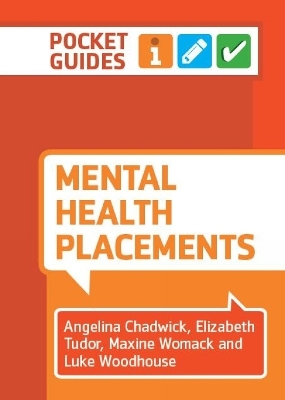
Mental Health Placements
Lantern Publishing Ltd (Verlag)
978-1-908625-71-7 (ISBN)
Placements can be daunting to the unprepared. This pocket guide is designed to make mental health placements more enjoyable and less stressful and to help student nurses get the most out of their practice learning experience.
A handy pocket guide to help mental health student nurses prepare for their practice placements.
Mental health nursing placements can be daunting – you’ll be working in a variety of settings and supporting individuals with a range of mental health problems. There are new colleagues to work with, and newly learned nursing theory to put into practice. This pocket guide is designed to make your placements much more enjoyable and less stressful.
From absence policy to personal safety, via least restrictive practice, it’s full of practical detail, hints and tips.
Written by a team comprising an experienced mental health lecturer, a Practice Education Facilitator and two recently qualified mental health nurses – this guidance is really produced with you in mind.
Pocket-sized format – carry it with you at all times.
Space to make your own notes – be it uniform policy, new terminology, or just the names of your new colleagues!
Reduce your stress and make the most of your placements by having this book to hand from the start.
Pocket Guides is a series of handy, pocket-sized books designed to help students make the most of their practice learning experiences.
Angelina is Lecturer in Mental Health Nursing a the University of Salford. She began her career as a general nurse in 1986, working in surgery. She later retrained as a mental health nurse and progressed into a variety of mental health nursing clinical and management roles within acute inpatient, older people and community practitioner areas. She moved into education as a training manager in an NHS Mental Health Trust, and then into higher education as a nurse lecturer in 2010. She is currently a module leader in the pre-registration degree nursing programme and teaches on both pre-registration and post graduate programmes. Her keen interest is around physical health in mental health. Angelina has published in a variety of nursing journals and textbooks. Elizabeth is Practice Education Facilitator in the Greater Manchester Mental Health NHS Foundation Trust. She began her career in nursing in 1977, qualifying as a State Enrolled Nurse working in surgery. She then retrained as a Mental Health Nurse in 1980 specialising in older adult nursing, predominantly dementia care. In 2003 she became involved in developing the assistant practitioner role across the Trust. She qualified as a lecturer / practice educator in 2005 and was heavily involved in teaching an in-house mentorship programme and supporting mentors in practice which has evolved into the implementation of the NMC Standards for Student Supervision and Assessment. Elizabeth is currently working to increase student capacity across the Trust. Maxine Womack is a Deputy Ward Manager in Greater Manchester Mental Health Foundation Trust. She started working in mental health in 2007. When she first started working in mental health Maxine was a domestic assistant in the private sector. She soon realised that working in mental health was what she wanted to do and so she then transferred her job role to a Support Worker. Maxine then commenced her Nurse Training in 2015. And qualified as a nurse in 2018. She currently works as a Deputy Ward Manager on a Male Rehabilitation Unit.
Getting there
1. Preparing for placement
2. Uniform
3. Absence policy
4. The NMC Code
5. Person-centred care
5.1 Least restrictive practice
6. Consent, confidentialityand safeguarding
6.1 Consent
6.2 Confidentiality
6.3 Safeguarding
7. Guidance on using social media
Settling there
8. Induction and first day
9. Working with those supervising your practice
10. Common documentation
11. Communicating with colleagues
12. Communicating with patients
Being there
13. Personal safety
13.1 De-escalation
13.2 Hand hygiene
13.3 Infection control and sharps policy
13.4 Moving and handling
14. Fundamental skills
14.1 Assessment
14.2 Drug administration
14.3 Drug calculations
14.4 Observations
14.5 Skin assessment
14.6 Urinalysis
15. Basic Life Support
16. Common medical emergencies
16.1 Anaphylactic reaction
16.2 Falls
16.3 Sepsis
16.4 Stroke
16.5 Seizures
17. Common groups of medications
17.1 Antipsychotics
17.2 Antidepressants
17.3 Anxiolytics
18. Pain assessment – pain tools
Moving on from there
19. Reflection and action planning
20. Common terminology
21. Quick references
22. Further reading
| Erscheinungsdatum | 10.05.2021 |
|---|---|
| Verlagsort | Cheltenham |
| Sprache | englisch |
| Maße | 105 x 148 mm |
| Gewicht | 95 g |
| Themenwelt | Medizin / Pharmazie ► Pflege ► Ausbildung / Prüfung |
| Pflege ► Fachpflege ► Neurologie / Psychiatrie | |
| ISBN-10 | 1-908625-71-6 / 1908625716 |
| ISBN-13 | 978-1-908625-71-7 / 9781908625717 |
| Zustand | Neuware |
| Haben Sie eine Frage zum Produkt? |
aus dem Bereich


